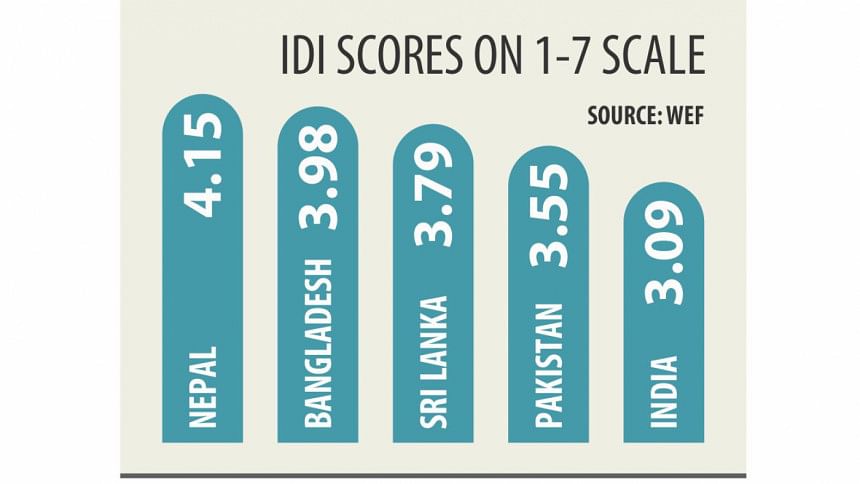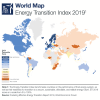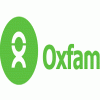WEF Development Index: Bangladesh ahead of most of its neighbours

Bangladesh has been ranked 34th in the World Economic Forum's Inclusive Development Index's (IDI) list of emerging economies, ahead of South Asian competitors India, Pakistan and Sri Lanka but behind Nepal.
India is ranked 62nd, Pakistan 52nd, Sri Lanka is 40th, the WEF says in the report published on Monday.
Nepal is ranked 22nd.
Norway remains the world's most inclusive advanced economy, while Lithuania tops the list of emerging economies.
On a scale of one to seven, Bangladesh scored 3.98 in the IDI, with one being the worst and seven the best. India scored 3.09, Pakistan 3.55, Sri Lanka 3.79 and Nepal 4.15.
The IDI is an annual assessment of 103 countries' economic performance that measures how countries perform on 11 dimensions of economic progress in addition to the GDP. It has three pillars; growth and development; inclusion and; intergenerational equity -- sustainable stewardship of natural and financial resources.
The IDI data suggest that relatively strong GDP growth cannot be relied upon by itself to generate inclusive socioeconomic progress and rising median living standards, says the report.
It says GDP growth is necessary but not sufficient condition for achievement of the broad-based progress in living standards by which most people judge countries' economic success.
This message is particularly relevant at a time when global economic growth is returning to a more robust level and policymakers can do more to future proof their economies and make them more equitable.
“Political and business leaders should not expect higher growth to be a panacea for the social frustrations, including those of younger generations who have shaken the politics of many countries in recent years.”
The report says decades of prioritising economic growth over social equity has led to historically high levels of wealth and income inequality and caused governments to miss out on a virtuous circle in which growth is strengthened by being shared more widely and generated without unduly straining the environment or burdening future generations.
Excessive reliance by economists and policymakers on gross domestic product as the primary matrix of national economic performance is part of the problem, since GDP measures current production of goods and services rather than the extent to which it contributes to broad socio-economic progress as manifested in median household income, employment opportunity, economic security and quality of life, according to the report.
The WEF urges the leaders to urgently move to a new model of inclusive growth and development, saying reliance on GDP as a measure of economic achievement is fuelling short-termism and inequality.
In a statement, Richard Samans, managing director and head of global agenda at the WEF, says economic growth as measured by GDP is best understood as a top-line measure of national economic performance. Broad, sustainable progress in living standards is the bottom-line result societies expect.
“Policymakers need a new dashboard focused more specifically on this purpose. It could help them to pay greater attention to structural and institutional aspects of economic policy that are important for diffusing prosperity and opportunity and making sure these are preserved for younger and future generations,” he said.
The report says rich and poor countries alike are struggling to protect future generations.
The index's Intergenerational Equity and Sustainability pillar, which takes into account public debt; carbon intensity of GDP; dependency ratio and adjusted net savings, actually deteriorated in upper-, middle- and low-income economies since 2012 and improved only marginally in advanced economies.

 For all latest news, follow The Daily Star's Google News channel.
For all latest news, follow The Daily Star's Google News channel. 






Comments